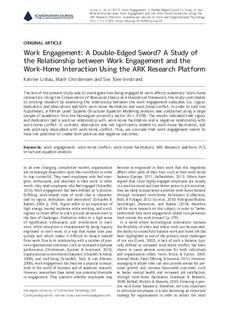Work engagement - A double edged Sword: A Study of the Relationship between Work Engagement and the Work-Home Interaction Using the ARK Research Platform
Journal article, Peer reviewed
Published version
Permanent lenke
http://hdl.handle.net/11250/2500796Utgivelsesdato
2017Metadata
Vis full innførselSamlinger
Originalversjon
Scandinavian Journal of Work and Organizational Psychology. 2017, 1-13. 10.16993/sjwop.20Sammendrag
The aim of the present study was to investigate how being engaged at work affects academics’ work-home interaction. Using the Conservation of Resources theory as a theoretical framework, the study contributes to existing research by examining the relationship between the work engagement subscales (i.e. vigour, dedication, and absorption) and both work-home facilitation and work-home conflict. In order to test the hypotheses, a Partial Least Squares-Structural Equation Modelling analysis was conducted using a large sample of academics from the Norwegian university sector (N = 4378). The results indicated that vigour and dedication had a positive relationship with work-home facilitation and a negative relationship with work-home conflict. In contrast, absorption was not significantly related to work-home facilitation, but was positively associated with work-home conflict. Thus, we conclude that work engagement seems to have the potential to create both positive and negative outcomes.

